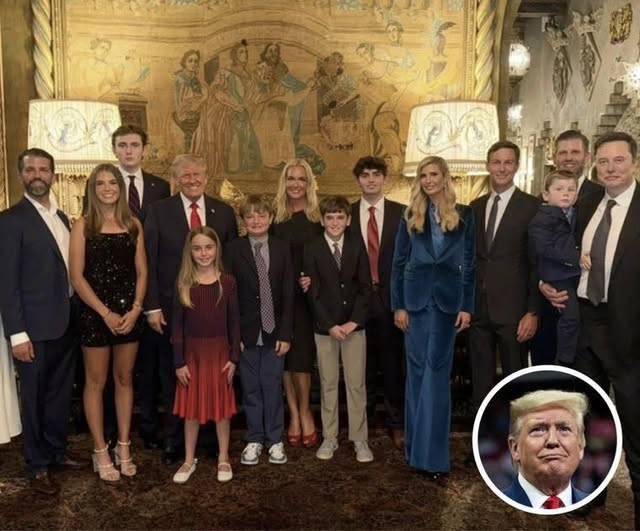When Kai Trump, Donald Trump’s granddaughter, shared a family photo on social media on election night, it instantly went viral.
The snapshot, taken at Mar-a-Lago, captured a rare moment of unity: the entire Trump family gathered to celebrate what supporters hailed as the beginning of Donald Trump’s political “comeback.” The mood was triumphant, the smiles both practiced and genuine — a vivid portrait of legacy, loyalty, and showmanship.
Every generation of the Trump family was present. Donald Jr. stood beside his fiancée, Kimberly Guilfoyle; Ivanka and Jared Kushner appeared with their children; Eric and Lara Trump smiled from the back, while Barron — now towering over everyone — stood near his father. Even Elon Musk, a recent Trump ally, appeared in the frame.
Yet one conspicuous absence dominated conversation: Melania Trump.
The former First Lady had been seen earlier that day, accompanying Donald to their polling station in Palm Beach — a rare public outing. But as the celebration unfolded, she was nowhere in sight. Within hours, speculation spread online: Was Melania stepping away from her husband’s political orbit for good?
Observers who have followed her closely weren’t surprised. Since leaving Washington in January 2021, Melania has prioritized privacy, stepping back from politics and public scrutiny. Multiple reports indicate she divides her time between Mar-a-Lago and occasional trips to New York, maintaining a small circle of confidants while devoting most attention to her son, Barron.
A longtime family associate, speaking on condition of anonymity, confirmed that her absence was deliberate. “Melania values her privacy above all else,” the source said. “She never enjoyed the constant spotlight of political life and is relieved to have it behind her.”
Her guarded approach isn’t new. Even during Trump’s first presidency, Melania maintained a famously reserved public profile. After the 2016 election, she remained in New York for several months so Barron could finish his school year, signaling a reluctance to dive into Washington’s chaos. Once in the White House, she shaped the role of First Lady on her own terms: limited appearances, carefully managed messaging, and minimal public engagement.
Staff and advisors described her as fiercely independent and intensely private. Her initiatives, such as the “Be Best” campaign, were deliberate, sincere, and tightly curated. “Melania never wanted to be a political figure,” one former aide said. “She wanted to be a supportive wife and mother, not a public servant.”
Now, as Donald Trump campaigns for a second term, Melania’s level of involvement has become symbolic, a litmus test of family unity, image management, and endurance. First Ladies historically serve as key surrogates, humanizing candidates and softening their public persona. Melania’s absence from the election-night photo stands out sharply against that backdrop.
Some strategists argue her distance benefits Trump. “Melania’s mystique adds to his brand,” one commentator said. “Her silence makes her intriguing. In a world of constant oversharing, she’s the only one who doesn’t feel compelled to explain herself.” Others interpret her withdrawal as a quiet refusal of the political stage. Stephanie Winston Wolkoff, a former friend and advisor, once described the Trumps’ marriage as “transactional”: Trump as the showman, Melania as composed and refined. Observers now question whether that dynamic endures as political stakes rise again.
Privately, those close to Melania insist her priorities remain unchanged. Barron, now preparing for college, remains her central focus. “Her world revolves around her son,” a source said. “Everything else — the campaign, the attention, the controversy — is secondary.”
Yet her choices carry symbolic weight far beyond personal preference. The role of First Lady has historically set the moral and emotional tone of an administration. If Trump returns to Washington without Melania by his side, it would mark a dramatic break from tradition, reshaping expectations of what it means to be a presidential spouse in the modern era.
Her absence sparked cultural debate. Some view it as a progressive statement — a woman not bound to her husband’s career. Others see a possible rift between Trump’s public ambition and Melania’s personal peace. Either way, the image of the Trump family celebrating without her spoke volumes: the patriarch surrounded by children, grandchildren, and allies, while the woman who once stood beside him on every campaign stage was missing. It was both a familial omission and a metaphor for the evolution of the Trump era.
Even in private events, Melania remains gracious but distant. She dresses in muted tones and engages politely, yet her attention seems elsewhere. Observers note her quiet composure, describing her as courteous but detached. Since leaving the White House, she has largely stayed silent on political controversies, including her husband’s legal challenges, offering no comment when asked. Some interpret this silence as strategy, others as exhaustion.
As the campaign unfolds, whether Melania returns to Washington or stays in Palm Beach remains uncertain. Some insiders suggest she will appear only ceremonially, selectively joining events to project family unity. Either scenario represents a defining shift. A First Lady who declines a permanent role in the White House challenges longstanding tradition but reflects modern expectations: independence and control over one’s narrative are increasingly respected.
In a political world dominated by noise, Melania Trump’s silence resonates powerfully. Her choices will influence not just the family’s image but the evolving role of First Ladies in American politics. For now, the woman who once quietly supported her husband remains just that — quiet, deliberate, and fully in control of her story.
